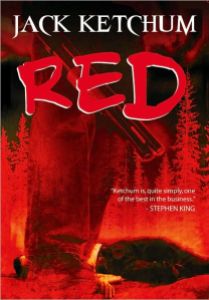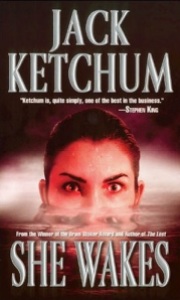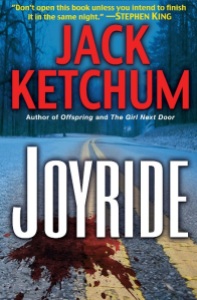“Weed Species—easily the darkest, nastiest thing I’ve ever written”
Fans of horror and suspense should need little introduction to the man Stephen King dubbed “the scariest guy in America”. Jack Ketchum has picked up numerous Bram Stoker Awards over the years and was recognised with the World Horror Convention Grand Master Award this year. He was tutored by and corresponded with the great Robert Bloch, and has released numerous novels and short story collections that demonstrate the versatility and spectrum of horror, weird, and suspense fiction. Amongst his most famous works are The Girl Next Door, Offspring, and Red. Each of which were made into thought-provoking films. Most recently he collaborated with Lucky McKee on both the book and film version of The Woman.
We are very humbled here at This Is Horror to present an interview with one of the great masters of horror, Jack Ketchum.
How did your correspondence and mentoring with Robert Bloch begin and did he share much of his own experience as a member of the Lovecraft circle?
JK: In high school my sophomore English teacher, Dorothy Senner, got it into her lovely head that the entire class should write a fan letter to some writer we’d read and enjoyed recently and see if we got any response, betting that some of us would. Turns out we all did – which says something about the generosity of writers in general – but while most of the kids got a postcard, I got a short letter, on letterhead, from Robert Bloch. I’d recently read Psycho. I was delighted. Then, unbeknownst to me, my mother wrote to him thanking him and said that she thought I had some talent as a writer, and wanted to write, and would he encourage me a bit? I only found this out from Bob after my mother died. He kept her secret for many, many years. But I got another letter from Bob saying he thought my original letter very well composed, and did I have any ambitions to become a writer myself? That begun a correspondence in which I showed him pretty much everything I wrote – poetry, plays, whatever – that lasted until he died. In fact I spoke to him two nights before he died. I told him I loved him. He said, “I know you do.”
Bob rarely spoke about Lovecraft, at least not to me, but when he did it was always with a smile.
 In The Girl Next Door chapter forty-two refuses to detail what happened to Meg next. Is this a case of self-censorship and knowing when to draw the line, or creating suspense through the refusal to detail specifics?
In The Girl Next Door chapter forty-two refuses to detail what happened to Meg next. Is this a case of self-censorship and knowing when to draw the line, or creating suspense through the refusal to detail specifics?
You write about very real horrors and confront subject matter that it would be cosier to shy away from. Is there anything you wouldn’t write about?
JK: Nothing. Except things that don’t interest me. If you ever find me writing about football or basketball, shoot me. I’ve gone senile.
Is storytelling both a necessity and cathartic experience for you?
JK: It’s often cathartic. But sometimes it’s just plain fun! There’s plenty of room for both kinds of writing. I don’t think it’s ever a necessity for me, at least not anymore. When I was young I was absolutely driven to write. I think most young writers are. But part of that is that you have to prove to yourself that you can write, that you’re any good. But these days I only do it when the spirit moves me. And if it doesn’t, no big deal. There’s always the internet or Netflix or a really good book by somebody else to read.
 Do you confront your own fears when writing?
Do you confront your own fears when writing?
JK: Sure. I figure if I don’t scare myself, if I don’t feel that dread of what’s coming up next, I probably won’t scare you. But the same is true of any emotion or feeling I try to get down right on the page. If I’m doing comedy, I damn well better make myself laugh. If I’m doing tenderness, I want to feel that too – I want to bleed a little. That way the feeling comes through to you. I wouldn’t know how else to do it.
You have previously said that you start the writing process with the characters, does this mean you have a host of unused characters waiting for the right opportunity to incorporate them into a story?
JK: Ha! Yeah, my brain is Times Square on New Years’ Eve! My characters are all blends of the characteristics of people I know, or have been exposed to through books and media … and me. What I imagine, sure, but also what I know about myself. How would I react, or hope to react, in various circumstances. I think I always have to start with my own emotions and then graft them onto the people I’ve been exposed to in one way or another.
You use a storyboard and plan each character meticulously before writing novels, is the process the same when writing short stories? How does the preparation differ?
JK: I’ve likened writing a book to a marriage, a novella or screenplay to an affair, and a short story to a one-night stand. You don’t have to prep much for a one-night stand. Normally what will happen with a short is that I’ll get an idea, sit on it a while – could be days, could be years – and then another idea will come along that fits somehow with the first one and maybe a third, and voila! a short story. A first draft of the usual twelve-page story will usually take me two days, a rewrite and polish one more.
 Why did you decide to go down the supernatural route with She Wakes and are the supernatural elements part of a wider metaphor?
Why did you decide to go down the supernatural route with She Wakes and are the supernatural elements part of a wider metaphor?
JK: Five years transpired between my first visit to Greece – I stayed for four months that time, I think it was in ’78 – and the second, in which I stayed for two. In five years a lot can happen and can be especially noticeable in a place you’ve come to love. What I saw on that second visit dismayed me. Not just signs of an economic downturn, hotels left unfinished, beaches littered, crime stats way up in the cities. But the people had lost a lot of warmth it seemed to me. That first time you felt welcome everywhere – that wonderful word feelokseeno means not only hospitality but friendship. That wasn’t the case with the second. The young people in particular seemed to be trying to ape American ways, to the detriment of what gave Greece its charm. So to that extent She Wakes, and its explosive climax in particular, was a metaphor for what I was wishing for – a return to and renewal of those special Greek virtues.
But the reason I wrote the book, really, is that Greece felt so goddamn big to me. I felt a kind of grandeur there that I’d only felt very rarely before. At night in the Maine woods for example. And I wanted to explore that, especially because unlike the Maine woods, this grandeur was not only of the natural world – Lawrence Durrell called Greece “untamed” – but of the pre-Christian human world too. You could almost feel Agamemnon and Clytemnestra whispering in your ear. A kind of awe, the spirits of the ancients all around, vast and wise and terrible all at once. I was after that sense of awe, and hope I got a little of it down.
You write both horror and dark comedy. Both elicit strong emotional reactions from the reader. Is this what makes them unlikely bedfellows?
JK: I don’t think they’re incompatible at all. In books, take Stewart O’Nan’s The Speed Queen, Stephen King’s The Cell, pretty much everything by Edward Lee or Richard Laymon, Joyce Carol Oates’ Zombie, Brett Easton Ellis’ American Psycho, just to name a few. The match-up is even more prevalent and seamless in movies. Shaun of the Dead, Day of the Dead, The Evil Dead, Texas Chainsaw Massacre…the list goes on and on. In my own stuff, with one exception, everything I did with Edward Lee and P.D. Cacek, The Woman, book and movie, both have major elements of satire, and my novella Weed Species, while I think it’s easily the darkest, nastiest thing I’ve ever written, is also the blackest of black comedy. Seems to me they can often sleep together nicely.
 How do you write succinct, realistic gore and ensure it doesn’t become puerile? Is the secret in psychological horror accompanying the gore through establishing a connection with the victims?
How do you write succinct, realistic gore and ensure it doesn’t become puerile? Is the secret in psychological horror accompanying the gore through establishing a connection with the victims?
JK: You’ve got that right. Gore for gore’s sake doesn’t interest me. Not even in film and certainly not in a book. For me it’s right up there with fake breasts – I see them, I fast-forward. The key again is character. You’ve got to be let into each character’s world enough to care about what happens to him or her, even if the person’s repulsive. We can care what happens to bad guys too. And you don’t have to follow a character for a hundred pages to give a damn, either. Take Joyride aka Road Kill. I’m not trying to get you to buy the book here, it’s just that I know my own stuff better than anybody else’s. So what you’ve got in Joyride is a guy getting off on drive-by shootings. To him, nameless victims. But not to me. I gave each of the victims a backstory, something in their lives that makes them unique – only a few paragraphs, but enough so that you understand that this is a real human being here who doesn’t deserve this shit, who is in the middle of a life cut short by this asshole. For whom you have sympathy and with whom you empathise. A novel that doesn’t stir up empathy’s unthinkable to me. Why else would you bother to read one?
WORDS: MICHAEL WILSON
PHOTOGRAPHS: STEVE THORNTON ©
If you enjoyed our interview with Jack Ketchum and want to read Jack’s fiction, please consider clicking through to our Amazon Affiliate links and purchasing a new book today. If you do you’ll help keep the This Is Horror ship afloat with some very welcome remuneration.






















1 comment
Jack is the man! A guy on youtube described him as having “balls the size of planets” for what he writes and I couldn’t agree more. What a legend.
Check out his short story ‘The Box’. By far the most unnerving short I’ve read.